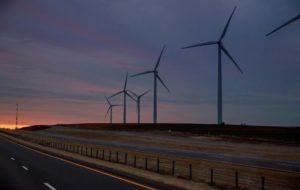 DeepMind claims it has trained an artificial intelligence system how to predict the energy output of Google wind farms in the U.S. The variable nature of wind makes it difficult to accurately predict how much energy a wind farm could produce in any given time period. But DeepMind says that its AI system can predict wind power output 36 hours ahead of actual generation with a reasonable degree of accuracy. “Based on these predictions, our model recommends how to make optimal hourly delivery commitments to the power grid a full day in advance,” a team of DeepMind researchers wrote in a blog post on Tuesday. “This is important because energy sources that can be scheduled (i.e. can deliver a set amount of electricity at a set time) are often more valuable to the grid.” Google claims that DeepMind’s AI system has boosted the “value” of its wind energy by roughly 20 per cent. “We can’t eliminate the variability of the wind, but our early results suggest that we can use machine learning to make wind power sufficiently more predictable and valuable,” the researchers added. DeepMind is a London-headquartered AI lab that was acquired by Google for a reported £400 million in 2014. DeepMind has been in talks with the UK’s National Grid about how to use DeepMind’s AI technology to better predict energy demand. In March 2017, DeepMind cofounder and CEO Demis Hassabis told The Financial Times: “We’re early stages talking to National Grid and other big providers about how we could look at the sorts of problems they have. It would be amazing if you could save 10% of the country’s energy usage without any new infrastructure”. Forbes
DeepMind claims it has trained an artificial intelligence system how to predict the energy output of Google wind farms in the U.S. The variable nature of wind makes it difficult to accurately predict how much energy a wind farm could produce in any given time period. But DeepMind says that its AI system can predict wind power output 36 hours ahead of actual generation with a reasonable degree of accuracy. “Based on these predictions, our model recommends how to make optimal hourly delivery commitments to the power grid a full day in advance,” a team of DeepMind researchers wrote in a blog post on Tuesday. “This is important because energy sources that can be scheduled (i.e. can deliver a set amount of electricity at a set time) are often more valuable to the grid.” Google claims that DeepMind’s AI system has boosted the “value” of its wind energy by roughly 20 per cent. “We can’t eliminate the variability of the wind, but our early results suggest that we can use machine learning to make wind power sufficiently more predictable and valuable,” the researchers added. DeepMind is a London-headquartered AI lab that was acquired by Google for a reported £400 million in 2014. DeepMind has been in talks with the UK’s National Grid about how to use DeepMind’s AI technology to better predict energy demand. In March 2017, DeepMind cofounder and CEO Demis Hassabis told The Financial Times: “We’re early stages talking to National Grid and other big providers about how we could look at the sorts of problems they have. It would be amazing if you could save 10% of the country’s energy usage without any new infrastructure”. Forbes
